The Most Comprehensive Guide to Satoshi Nakamoto (Big Post)
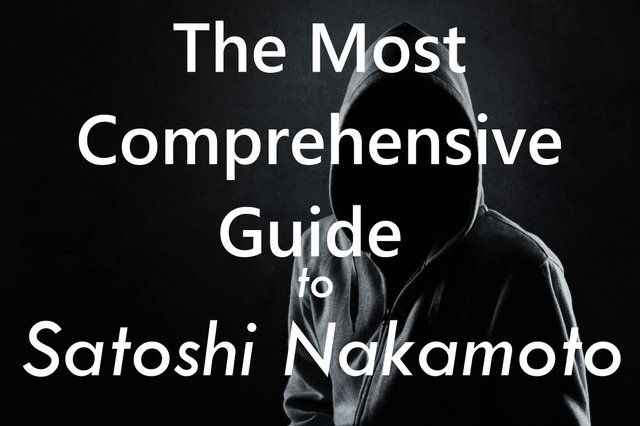
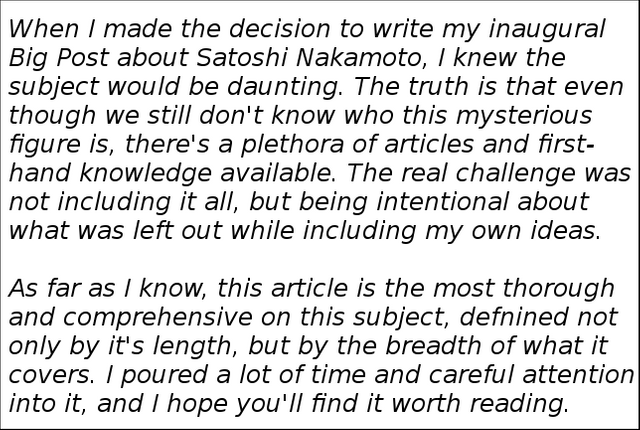
We are about to take a journey down a rabbit hole. Before we begin, a few things.
This question has been visited many, many, many times before over the past few years. So those of you who've been on the crypto scene for a while might wonder, "Why ask again? And why now?" But I think now is the perfect time for several reasons:
1.) Bitcoin's skyrocketing (and more recently plummeting) price is bringing cryptocurrencies to the forefront of mainstream attention. This means an influx of new users who might not even understand why this is an important question.
2.) It's been some time since someone really asked the question. I think it's important to give it a go with fresh eyes, standing atop all of the investigating done so far and digging deep into the source material and documents from which the mystery originates.
3.) It’s clear that crypto is having a strong impact on world events. As cryptocurrency gains mainstream acceptance and beings to shape world economics and politics, any understanding of its origins is likely going to be equivalent in importance to understanding the origins of money in general.
4.) Perhaps most importantly of all, the centralization of financial power and governance has shown itself to be extremely problematic time and again over the past century. It was the best option we had until bitcoin was released. But in our haste to find a better solution, is it not prudent to inspect every aspect of something so important? Bitcoin itself feels a bit like a gift from an unknown sender: we might be overjoyed to receive it, but there's still a certain tension in the inescapable feeling that there is some unknown element in it or consequence of it that we don't yet see. Putting these fears to rest means understanding the gift sender's motivations, if not knowing who they are outright.
There is a long history to Bitcoin. Knowing the main highlights is prerequisite for the arguments that follow. I think a lot of the events and speculation are quite interesting and I hope you'll feel the same way. Also, it's not as though a working knowledge of the history of Bitcoin will advance your crypto education and help you keep things in perspective.
Lastly I want to ask you to open your mind a bit. Certainly don't be afraid to use your critical thinking abilities, but one of the approaches I make is to start with a 'pure profile' of Nakamoto using pure reasoning before diving in. This will likely take place after the history because, as I said, it's prerequisite.

On August 18th, 2008 the domain name bitcoin.org was registered. This, as far as anyone knows, is the first public appearance of the world 'bitcoin'. On October 31st of 2008 a whitepaper was published in this entry of a cryptography mailing list. You can take a look at the archives of that mailing list here (just scroll down to October 2008 and click the 'thread' next to it, then go down to the first second entry entitled Bitcoin P2P e-cash paper [hint: It'll be the one by Satoshi Nakamoto]). For the main page of the mailing list you can go here (sign up at your own risk, I have no idea whose hands the site is in, now).
In this whitepaper Satoshi Nakamoto lays out the groundwork for an immutable distributed public ledger (blockchain) that solves the at the time infamous double spending problem. We won't go into it in detail here, as that's not the purpose of this article, but the basic problem is this: given that there is some processing time for a cryptocurrency algorithm to record a transaction, what's to stop a clever bad actor from spending the same crypto twice?
In January of 2009 Satoshi Nakamoto brought the bitcoin blockchain online by mining the first block. In this block is this text:
The Times 03/Jan/2009 Chancellor on brink of second bailout for banks.
It's speculated that this is meant to be proof of the date of creation of the genesis block and also a pot shot at the instability of the fractional reserve system. Personally, I think he was pointing out why he was creating bitcoin, or why he timed it when he did. The global financial crises of 2008 and 2009 put the western world in the biggest slump it had seen since The Great Depression and had confidence in the centralized banking system and government at an all time low.

Before we go further, let's give a little thought about what basic parameters likely describe Satoshi. For our purposes we are going to dismiss anything with a less than about 20% probability as being untrue and with more than an 80% probability as being true (a convention we'll stick to in order to keep ourselves sane).
For example, we know that at the time of his writings he wasn't five years old. It's possible I suppose, but it's so unlikely that we can pretty much dismiss it. But going further, it's unlikely that he was 15 or younger, either. The requisite knowledge and skills in such a person would put them at the genius level. Even if they tried to keep quiet, it's unlikely that teachers, parents, and friends would allow such a mind to go unnoticed for long. Again, not impossible, but unlikely enough to dismiss (probably less than 20% likely).
How old would a person have to be in order to know the things required in order to develop blockchain technology? They'd have to have familiarity with the field as it stood, and with the double-spending problem. They'd need a deep understanding of coding, mathematics, internet infrastructure, and software vulnerabilities. Moreover, even if Satoshi Nakamoto was a single person (which we'll assume because it's likely that mostly only one person did the bulk of the work and writing under the pseudonym even if he did have help... and admittedly for simplicity), they would need many connections in the cryptography and coding communities in order to develop, refine, and propagate their ideas. Even if they started with this stuff at around the earliest time possible (we'll arbitrarily say 15 years old) it would have probably taken a minimum of at least five years to accrue all of these things. Assuming the earliest age one could begin to pursue these ideas is around 15, that puts us at around 20 year old as the minimum age.
It's unlikely that he's very, very old (over 55) because the creation of the idea of blockchain requires an understanding of up-to-date technologies and methods and people that old are outliers as far as being active tech creators at that age. In fact, given the fact that the original code was written in C++ (older programmers at the time preferred C among others) it's unlikely that Satoshi was over the age of 40 at the time he created the original code.
Less easy to set in stone is Satoshi's gender, a question that no one has seriously even bothered to question. It's true that these are traditionally male-dominated fields and so the assumption isn't totally sexist (but it is a little). Also, because the coding, comments, and English used is all 'perfect English', we can also assume that Satoshi is a native speaker. It's also likely that he comes from a first world country, as the infrastructure and accessibility of technology and information is better.

Satoshi Nakamoto was likely a male between the ages of 20 and 40 in 2009 who lived (and was born) in a first world country. Also, he is likely known to have extensive experience in at the very least mathematics, cryptography and coding. Not exactly a profile you can take down to a police sketch artist.
Moreover, the name Satoshi Nakamoto is itself a hint at the true identity. It tells us that whoever he is, he is likely either of Japanese descent, a fan of Japanese culture, familiar with the name Satoshi Nakamoto, or using the name as some sort of joke, hint or puzzle. Again, a pretty wide berth of possibilities. Still, it's a start.
Thus, the full picture becomes that Satoshi is most likely a male with some connection to Japan who is between the ages of 20 and 40, was born in a first-world English-speaking country, has extensive experience in math, cryptography and coding, and is well connected within the crypto community.

Without using that much evidence outside of that which just about everyone in crypto knows, we've narrowed down a rough outline of who Satoshi Nakamoto is. Now we'll use evidence (mostly circumstantial), to narrow down the picture further. We'll start with small details that give us hints, and move to more complicated assessments based on inference and deduction.
First of all, if you go to Satoshi Nakamoto's archived profile page on the P2P Foundation website (The Wayback Machine is a repository of old versions of web pages. It's pretty awesome, actually and you should check it out - after you read this post) you'll find that he calls himself a 36 year old male living in Japan:
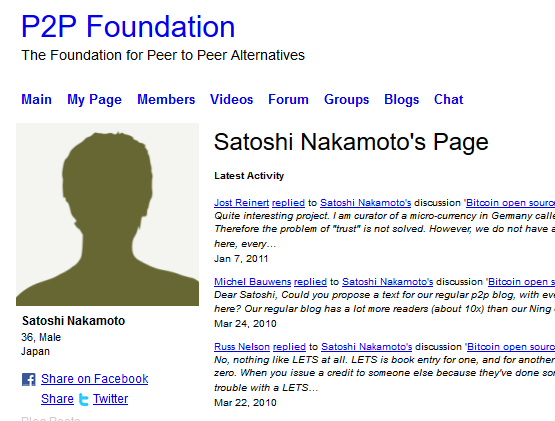
However, some have speculated that this isn't the truth because of, as previously stated, his perfect use of English and the fact that his documentation and software labeling weren't in Japanese. However, while not insignificant I feel that this is a rather weak case for Nakamoto not being Japanese. It would make a lot of sense, for example, if he was Japanese but grew up elsewhere. Indeed, it doesn't seem like the possibility of Nakamoto being at the very least a Japanese man, if not a Japanese man actually named Satoshi Nakamoto, has been seriously considered often enough.
Then again, inspect the picture above once more. It says that he is a 36 year-old male living in Japan, not that he's Japanese. It's possible that he was a foreigner living in Japan. But then it is strange that he would be truthful about this, yet go to such other pains to hide his identity.

Something that I feel is extremely important but absent on almost every article talking about Satoshi is the fact that his first appearance (as far as I could find, and I searched thoroughly) was in the post in which he introduces Bitcoin. This combined with the fact that there is not a single other Japanese (or indeed, even Eastern) name on this mailing list in the archives suggests something critical: namely that Satoshi Nakamoto was not only a pseudonym, but one that was created with the express purpose of introducing Bitcoin. This means that there’s probably not much of a reason in particular to suspect that Satoshi is actually Japanese (especially when combined with his perfect English and hours of operation). It’s much more likely that, assuming he’s a single individual, he’s someone of European decent living in Japan or with relatively strong ties to it (or that it's just something to throw us off).
Satoshi also went through great pains to hide his identity. He created an anonymous email account, never shared any personal details, and took great pains to avoid doing so even when registering bitcoin.org. How he did this is in itself its own story, and adds whole new elements to the mystery.
It’s unlikely that Satoshi just randomly dropped in on the cryptography mailing list. It’s far more likely that he was a long time follower of the mailing list (if not a participant - indeed many such people have been identified as likely suspects) and used it as a platform to fuel and refine his ideas.

There have been a lot of people accused of being Satoshi Nakamoto. Because this topic is covered in pretty thorough detail in various places (including the Satoshi Nakamoto Wikipedia Article) I am going to focus on the most and least likely suspects in this section. I’ll talk briefly about the the others in the next section.
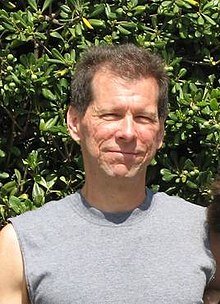
Hal Finney - Age 53 in 2009
Of the people accused of being Satoshi Nakamoto, the most likely (and also the most accused) people are as follows: Hal Finney, Wei Dai, Nick Szasbo, and Dorian Satoshi Nakamoto. A few of you might be saying: “but what about Craig Steven Wright?” I’ll get to that in a bit. First, one by one, I’m going to explain to you why I think no one on this list is likely to be Satoshi.
Of the listed suspects, none has been more persistently accused than Hal Finney. Hal Finney (Harold Thomas Finney) was a computer programmer and cryptographer. He was part of the “cypherpunk” movement of the late 1980’s and early 90’s and the earliest adopter of bitcoin aside from Satoshi himself. Given his intimate knowledge of cryptography and the fact that he was essentially at “ground zero” of bitcoin (he received the first bitcoin transaction), many have suspected that he is, in fact, Satoshi.
On a practical level, this makes no sense. It would mean Hal would have not only orchestrated a transaction from himself to himself, he also faked weeks of correspondence in emails from and to Satoshi. Was this really the most effective way to hide himself as the creator of bitcoin? There are more concrete reasons why I don’t think it’s him. This forum post made by Finney talks about his experiences with bitcoin and Satoshi. In it, he mentions that he has ALS and that it is fatal (indeed it was, he has since passed and is currently being cryopreserved). Yet even on his deathbed he refuses to confess to being Satoshi:
Today, Satoshi's true identity has become a mystery. But at the time, I thought I was dealing with a young man of Japanese ancestry who was very smart and sincere. I've had the good fortune to know many brilliant people over the course of my life, so I recognize the signs.
Why would this man, on his deathbed, still refuse to admit to being Satoshi? It seems pretty unlikely. Definitely under 20% likely. Still not convinced? How about this letter published in this Forbes article from Hal himself late into his ALS (the letter was written with eye tracking software and took him the better part of a day):
I must be brief. The reason I was skeptical about Dorian Nakamoto is that he didn't match the picture in my mind that I had of Satoshi. I pictured him younger, as he was giving the impression of youthful vigor. Then there is the language Bitcoin was written in, C++. Satoshi was a master of the intricacies, and I've only seen this in young programmers. It seems hard to master C++ if you didn't learn it while you're young. As I have learned more about him, there are details that don't add up, such as his care for an aging mother, which might cause financial strain.
As for your suspicion that I either am or at least helped Satoshi, I'm flattered but I deny categorically these allegations. I don't know what more I can say. You have records of how I reacted to the announcement of Bitcoin, and I struggled to understand it. I suppose you could retort that I was able to fake it, but I don't know what I can say to that. I've done some changes to the Bitcoin code, and my style is completely different from Satoshi's. I program in C, which is compatible with C++, but I don't understand the tricks that Satoshi used.
As far as your theory that I knew Dorian, that is unlikely because I lived in Temple City more than a decade ago, when Bitcoin hadn't even been dreamed up. Again, I categorically deny any familiarity with Dorian Nakamoto.
Satoshi Nakamoto almost certainly wasn’t Hal Finney. For me, the killing blow is his age. He was born in 1956, making him around 53 years-old around 2009 when bitcoin was released. If you look at the things Finney has programmed or worked on, it's almost always been in C. He wouldn't have had the requisite skills to write the bitcoin code in C++.
Wei Dai ~ Age 40 or older in 2009
Wei Dai is a computer engineer and another member of the cypherpunk movement in the 80’s and 90’s. On the Bitcoin Wiki he’s described as an “intensely private computer engineer”, and if my attempt to research him was any indication this is correct. I could not find even one reliable photo of the man (that I was certain was him). He proposed a precursor to bitcoin called b-money that was never created.
Strangely, not a lot of research seems to have been done to disprove that Wei Dai is Satoshi.
However, there are still reasons to doubt that Wei is Satoshi. For one, Wei had already released his idea for a cryptographic currency - b-money, which he started working on in 1995. Satoshi specifically mentions starting work on bitcoin in 2007 (the last paragraph in the link). Anyway, why would Wei release two versions of a cryptographic token, one as himself the other in private? Further, would Wei even have been able to create two versions in such a short time? If he’d come up with a better version later, why not simply update his b-money proposal? Too much doesn’t add up from the start, which is likely a part of the reason why journalists haven’t pursued Wei as Satoshi with any amount of vigor.
Lastly we come to the age question. I couldn't find his age directly, but in his AMA on the site Lesswrong.com he mentions that he and Nick Szabo "graduated within a few years of each other". Nick, as you can see from his Wikipedia page graduated in 1989. Assuming Wei went straight to college from highschool and graduated on time, that puts him around 22 years old as of 1989, meaning he was around 40 in 2008, a bit old to have a full mastery of C++ and to be writing bitcoin.

Nick Szabo ~ Age 40 or older in 2009
For a long while Nick Szabo was the favorite to be Satoshi. Nick is a “computer scientist, legal scholar, and cryptographer” known for the creation of the phrase and development of the concept of smart contracts.
Nick has recently been a favorite for Satoshi as he seeminlgy has all of the requisite knowledge and had been working on his idea for a cryptographic currency, bitgold, for some time before bitcoin. It’s my opinion that Nick has been accused of being Satoshi for much the same reasons that Wei was: there’s not much hard evidence for or against it.
Of those listed so far, it is my opinion that the most likely person to be the inventor of bitcoin (again, assuming it is an individual) is Nick Szabo. But like the others, there are reasons I seriously doubt this.
Nick had been working on bitgold as himself online for years. He wrote about such things in his blog, even. It’s true that around the time bitcoin was released the FBI had shut down several operations involving new forms of currency. However, it’s seems strange that this would force Nick immediately underground to redevelop and release his idea in a different form under a secret identity. He must have known that he would remain one of the most likely suspects given his background and bitgold.
Those who think that Nick is Satoshi often point out that bitgold isn’t mentioned in the bitcoin whitepaper, unlike Wei Dai’s b-money. They say that this was an attempt to point attention away from himself, but this is ridiculous. If Nick were Satoshi he would have realized that not including bitgold as an inspiration for bitcoin would be far more suspicious. Moreover, there’s a perfectly good reason for this exclusion: Satoshi was unaware of bitgold when he developed bitcoin. You must remember that a lot of writings were happening in the cryptography space. These included Adam Back’s Hashcash, a precursor to the main implementation and idea of cryptographic currency. Over the decades leading up to bitcoin Satoshi would have had more than enough to fuel his ideas and develop them.
Nick and Wei, as we proved earlier, are likely around the same age. Again, too old for our profile of the bitcoin inventor.
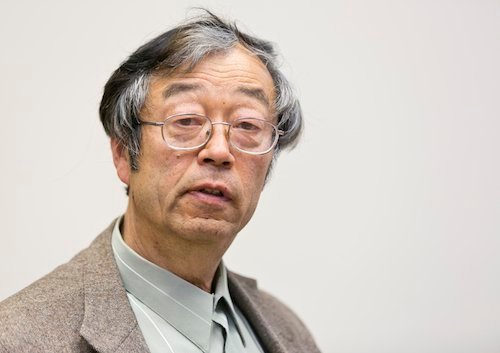
Dorian Satoshi Nakamoto - Age 59 in 2009
Living less than two miles from Hal Finney, a man of Japanese descent by the name of Dorian Satoshi Nakamoto (born Satoshi Nakamoto) was a retired physicist, systems engineer, and government employee who was doxxed as Satoshi in a Newsweek article.
Under this section I sorf of just wanted to put a giant, emboldened “NO” and move on.
But, for the sake of thoroughness, I’ll list in quick succession the reasons why Dorian is almost certainly not the Satoshi Nakamoto:
He’s too old. This Forbes article written in 2014 puts him at age as of the time it was written, meaning he would have been 59 in 2009. Go look at Hal Finney’s interview above once again. Note what he says about the style of C++ and how he was certain that it was someone relatively young, younger than him. Moreover, Dorian is not known to have any of the barest requisites for even thinking of bitcoin, let alone creating it.


At one point there was a lot of speculation that Satoshi Nakamoto might be a man by the name of Craig Steven Wright. It is my belief that it this is unequivocally false. The man is a known liar. A simple perusal of his Wikipedia article will corroborate this fact. He tried to start a bitcoin-based bank…. An attempt to introduce third party dynamics into something inherently built from the ground up to remove them. He’s received millions in fiat tax incentives for one of his companies, which doesn't really sound like someone who wants to move things away from fiat.
At one point he did claim to have proof, but this was later revealed also to be a lie. Of the people listed here and elsewhere, there is one that I would bet almost anything isn’t Satoshi: Craig Steven Wright.
If you're still holding onto a shadow of a doubt, read this.

We want to believe that the answer is among the choices present to us. People who have developed a reputation, who have landed themselves on the global radar in one way or another and have some connection to the cryptography scene. But the simple fact of the matter is, whoever Satoshi is, he’s done a very good job of staying off of the radar. There are even odds that he (or she) was someone in the metzdowd mailing list (other than Satoshi)… but from what I’ve gathered this appears to be tens, if not hundreds of people - many of whom have scant information about them available or who did not use their actual name as a handle.
All of this leads me to a conclusion that people just don't accept, can't accept. More likely than not, Satoshi Nakamoto is a completely unknown person. That’s right. Not only is he no one on this list, he’s no one on anyone’s list…(well, nearly, we’ll get to that in a second) and he likes it that way. That means if you know someone who has been listed as a suspect, there's a great chance it isn't them.
A tad disappointing I know, but lest you lose heart…
During my research I came across this that talks about the entity that likely knows the mysterious bitcoin creator’s true identity. Probably it comes as no surprise that this is a government agency, namely the NSA. How did they do it? They used something called stylometric analysis, comparing the writings of Satoshi with a wide scan of all writings on the internet. You heard me right.
This technique had been tried by various hackers, would-be detectives, and companies over the years, but with limited success. In order to do it properly you would not only need enormous resources, but nearly unlimited access to online information. The NSA fits the bill.
Now you might wonder why the NSA would be interested in the inventor of bitcoin. According the article, it’s because they were afraid it was some sort of economic terrorism on the part of the Russians. Not all that bad an assumption... if you don’t understand the design of bitcoin. After all, the Russians would want something they could ultimately control.

It’s my belief that we will one day know who Satoshi Nakamoto is. Most of the information on the net is persistent, and the tools to access and navigate it are only going to get better. There's also a chance that Satoshi will, ya know, want to spend a little of his piles of millions at some point. If Satoshi moves so much as a single coin (or fraction of one) people are going to notice. There’s also a pretty good chance that Satoshi will emerge into the limelight around some other project that he’s spearheading.

There’s been some talk that Satoshi Nakamoto wasn’t one person, but an entity. I disagree with this assessment: I think he received help alright, but that no one who helped him knew who he was or even necessarily that they were helping him. It becomes harder by an order of magnitude to keep a secret with each person that is introduced to said secret.
Also, everyone that interacted with him (Nick Szabo, Wei Dai, Hal Finney) seemed to have the distinct impression that they were dealing with a single person over their years of interaction with Satoshi.
However, it could certainly have been an organization. Probably not a business, but perhaps a government agency (or someone within one of these agencies). That might seem strange when I just provided an article saying the NSA had discovered Satoshi… but maybe that’s why they haven’t done anything. They discovered it was another agency.
... But that’s pretty unlikely.
Well, how about this?
What if Satoshi was a woman? I might not go so far as to call this theory 'wild', but you would certainly think it was based on the fact that few have considered this seriously. It’s true that back when bitcoin was created STEM (especially the, at the time, esoteric field of cryptography) was dominated mostly by men, but there were a few female stars in the field, it must be said, and that one of them could be the mysterious Satoshi is far from impossible. At one point Margaret Raunchy was a favorite in some circles for Nakamoto. She even got a few articles explaining why.
….Or….
What if Satoshi hid the truth of his identity in plain sight? At this site you can see a list of anagrams for Satoshi Nakamoto. I think my favorite is Satan Oath Ski Moo.
There are a lot of people who think that the Nick Szabo and Satoshi Nakamoto both have N and S in their names because this is what Szabo intended as a nod to the truly perceptive. But that’s a little too easy for the inventor of bitcoin, don’t you think?
Or perhaps most ludicrous of all....
What if A.I. has already gained sentience on the net and has decided the final piece it needs to dominate and control humanity is removing all physical and government controlled forms of money? The odds are probably less than .0001%, but hey, that's not the same as 0% now is it?
Satoshi Nakamoto, whoever he or she (or it) is, is obviously an ardent student of technology and cryptography. It would come as no surprise to learn that he also follows world news and current events with equal vigor and has a deep understanding of money, economics, and human behavior. However, I think there's a pretty good chance that he's into pop culture, movies... and, dare I even suggest it, comics. In the graphic novel turned movie V for Vendetta, the main protagonist, V, is a costumed hero in a mask and cape whose age, race, and sex are all hidden to the last from the audience. At a pivotal moment at the end of the movie, the character who is his protege is tempted to remove his mask but ultimately decides not to.
So to are we faced with a similar decision.
Satoshi might well have chosen to hide his identity to protect himself, if not his creation. But maybe there's another reason. Maybe he wanted to make the idea something apart from himself, something unassailable. In that, it seems he has succeeded. So whether Satoshi is someone completely unknown, you, someone you know, or even me, might ultimately be irrelevant.
Much like V, Satoshi has come to represent an idea totally separate from its human counterpart. A dream of decentralization that now lives within us, the people who continue to carry the torch of that dream despite setbacks, fear, and uncertainty.
As we contribute our ideas, arguments, and vision of what shape cryptocurrencies and blockchain technology should take in the future, we are all building the revolutionary platforms of tomorrow. In that sense, maybe we are all Satoshi Nakamoto.

The really fascinating thing about researching Satoshi Nakamoto was finding out more about the people of the cypherpunk movement, the economic crises of the years before 2010, and the attempts at cryptocurrency preceeding bitcoin. I was particularly struck by just how much accessible information straight from those who were accused of being Satoshi seemed to go untouched or unnoticed. I've linked to a lot of these things in the article above, but if you'd like to do further reading check out:



The big post is here!!! Wow... this sets a new bar for the term “Quality Post”. I don’t have time to read it this second, but I can’t wait to sit down and enjoy this post. (Maybe with a bowl of popcorn) 😉
I actually know very little about the man himself, and I’m excited to learn more through your article. Re-steemed to hopefully get a few more eyes on your big post!
Yup, it's here. I put my all into this thing. Can't wait to hear your thoughts! And thank you so much for sharing this!
Very interesting and informative read...
It's a shame Satoshi chose to remain anonymous (I'm sure they have their reasons for it though).
But I think if there wasn't so much mystery behind the entity... Crypto wouldn't have so many doubters, and would be worth more...
But in that case, if it was simple and explained it may have just be another platform for the rich to get richer...
Maybe it was initially designed to break the banks, cause chaos and disrupt governments all over the world. If this is the case, now that some banks are talking about jumping on board with crypto currency... Maybe Satoshi might finally Raise their(what ever they choose to identify as) head from hiding, to stop the banks being able to prevent the original mission of bitcoin?
My tin foil hat just broke, I need to go make another one.....
Congradulations on finishing this great opus. Great to have all the evidence laid out in one place and thought over. Only sorry it didnt get the exposure it deserves. I'll resteem in the hopes it gets a few more views.
My taughts on the subject are he wanted to just get it out there and let it have a life of its own without having to be some sort of public face. Like Dan Larimer he might have wanted the community be its guiding light and move onto the next project using bitcoin as a petri dish of ideas.
Hey, thanks!
I think you may not be far off the mark when you say that he just wanted to put it out there and see what happened. It's doubtful that even Satoshi himself would have been able to predict the full consequences of bitcoin and the popularization of blockchain technology.
I have often thought that myself, what if Satoshi’s goal of staying anonymous was to step back and let the ball roll? or as you put it “we are all Satoshi Nakamoto”.
That being said I also believe that an A.I./blockchain entanglement is inevitable, whether or not satoshi is said A.I. I find myself digging into the 5g internet of things. I like my conspiracy theories though I don’t think they are correct. Conspiracy always jumps to worst case scenario, so if the A.I. was benevolent rather then malevolent I would speculate the creation of cryptocurrency would be an attempt to correct inflation. An A.I.’s reasons for being secretive could be the understanding that addoption has to happen on our time for it to not be oppresive.
nailed it! 😝
Haha. I like the way you think! A positive spin on the A.I. argument. Blockchain and a.i. are definitely destined to be married at some point. The results will be staggeringly powerful and resilient. It's actually kind of hard to imagine what all might be possible.
And I totally agree. Conspiracies are fun! That's why I included the last section and let myself go wherever.
I try, if the only thing I can do is comment I make it original or educational sometimes both.
Definitely very well written article with a lot I wasn’t already aware of! Way past my current level of writing but I plan to keep working at it(maybe the positive A.I. spin will be next). Keep up the solid work, curious to see what direction you go next.
Thank you for making such and informed and readable article about Satoshi Nakamoto and who and for what reasons he might be or not 💡 I find the juxtaposition between satoshi's anonymity and notoriety to be of particular interest 🤔 in a way one might consider Humanity's interaction with the network providing a self-aware and consciousness aspect that one day may be replaced buy artificial intelligence and sometimes I think that ideas like the distributed Ledger are emergent qualities that combine both the ideas of human society and networks in general and how they interact with each other in the form of a climax ecosystem💥 satoshi's invention wherever it came from has brought to the world something that never existed previously, a completely distributed consensus and trustless guarantee 🚀
First off, thanks for your thoughtful comment.
I think bitcoin or something like it was probably inevitable at some point. But none of us could have suspected that it was just around the corner, or that it would have such an enormous impact on the world. The mystery of Satoshi, if anything, seems to fuel his notoriety. At this point he's basically a legend, and the more time that goes without us knowing exactly who this person is, the larger that legend will probably be in the long run.
The reason it's able to reflect "ideas of human society and networks in general" is because, at it's core, human society is nothing but a network with certain relationship and hierarchy rules. That these rules are moving into a virtual space at an ever quickening pace is fascinating.
I wonder if you think that satoshi's anonymity has any further purpose now that Bitcoin and the blockchain has been released into the wild? Initially it would have made sense to keep his identity a secret to protect the idea of distributed Ledger Technologies and the ability to create one's own currency. So often in the past and the present for that matter the ability to create money has been the sole property of governments and people in power. Since blockchain however this is no longer the case and so it poses a direct threat to the powers-that-be and those that would like that power to remain in the hands that possess it. Now the cat is out of the bag and distributed Ledger technology in all of its many forms are evolving fast and even individuals have the ability to create their own tokens and coins very easily on platforms such as a etherium or waves. Blockchain and Bitcoin can no longer be stopped by taking out their inventors and even the technology itself by the very nature of its descentralization in my opinion cannot be stopped ☺🌈 that's part of the promise of the future do you think?
Great article, @jenkirocket!
Hey, thanks man! I busted tail on this one, haha.
That, you did!
It was a great article, and sparked some interesting opinions. Following you, and eagerly waiting to hear your next post about Satoshi... With the amount of work put into this article... I imagine it will be a while.
But worth the wait.
Thanks for this great read! MediKatie and I enjoyed it over a few dabs of sour diesel : )
Glad you mentioned AI! I've been thinking for a while that AI actually already exists, in advanced form, and in secret. I think it's probably being used by government and elites to strategize against the people. Aaaand, I wonder if they used it to create blockchain technology and set the whole bitcoin thing in motion several years ago.
Nice to meet you, we're from Vancouver BC.
this is solid investigation, I learned a lot.
i also investigate 'rabbit holes', check out privacy workshop when you get a chance.
peace!